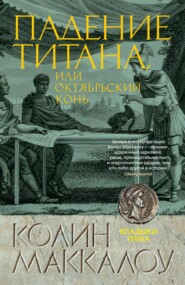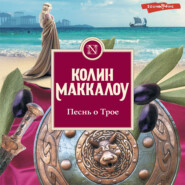По всем вопросам обращайтесь на: info@litportal.ru
(©) 2003-2024.
✖
Antony and Cleopatra
Автор
Год написания книги
2019
Настройки чтения
Размер шрифта
Высота строк
Поля
‘How considerate of him.’ The extraordinarily beautiful face puckered, the eyes looked strained. ‘As well, then, that I took it upon myself to give Lepidus six legions and send him off to govern Africa. Has Antonius heard of that yet? My agents say no.’
‘So do mine,’ Maecenas said. ‘Antonius won’t be pleased, Caesar, so much is sure. Once Fango was killed, Antonius thought he had Africa in the sinus of his toga. I mean, who counts Lepidus? But now that the new governor is dead too, Lepidus will walk in. With Africa’s four legions and the six he took there with him, Lepidus has become a strong player in the game.’
‘I am aware of that!’ Octavian snapped, nettled. ‘However, Lepidus loathes Antonius far more than he loathes me. He’ll send Italia grain this autumn.’
‘With Sardinia gone, we’re going to need it,’ said Taurus.
Octavian looked at Agrippa. ‘Since we have no ships, we have to start building some. Agrippa, I want you to doff your insignia of office and go on a journey all the way around the peninsula from Tergeste to Liguria. You’ll be commissioning good stout war galleys. To beat Sextus, we need fleets.’
‘How do we pay for them, Caesar?’ Agrippa asked.
‘With the last of the planks.’
A cryptic reply that meant nothing to the other three, but was crystal clear to Agrippa, who nodded. ‘Planks’ was the codeword Octavian and Agrippa employed when they spoke of Caesar’s war chest.
‘Libo returned to Sextus empty-handed, and Sextus took—er—umbrage. Not sufficient umbrage to plague Antonius, but umbrage nonetheless,’ Maecenas said. ‘Libo didn’t like Antonius any better in Athens than he had in other places, therefore Libo is now an enemy dropping poison about Antonius in Sextus’s ear.’
‘What particularly piqued Libo?’ Octavian asked curiously.
‘With Fulvia gone, I think he had rather hoped to secure a third husband for his sister. What cleverer way to cement an alliance than a marriage? Poor Libo! My spies say he baited his hook with great variety. But the subject never came up, and Libo sailed back to Agrigentum a disappointed man.’
‘Hmmm.’ The golden brows knotted, the thick fair lashes came down over Octavian’s remarkable eyes. Suddenly he slapped both hands upon his knees and looked determined. ‘Maecenas, pack your things! You’re off to Agrigentum to see Sextus and Libo.’
‘With what purpose?’ Maecenas asked, misliking the mission.
‘Your purpose is to make a truce with Sextus that enables Italia to have grain this autumn, and for a reasonable price. You will do whatever is necessary to achieve that end, is that understood?’
‘Even if there’s a marriage involved?’
‘Even if.’
‘She’s in her thirties, Caesar. There’s a daughter, Cornelia, almost old enough for marriage.’
‘I don’t care how old Libo’s sister is! All women are the same from the waist down, so what does age matter? At least she won’t have the taint of a strumpet like Fulvia on her.’
No one commented upon the fact that, after two years, Fulvia’s daughter had been sent back to her virgo intacta. Octavian had married the girl to appease Antony, but had never slept with her. However, that couldn’t happen with Libo’s sister. Octavian would have to sleep with her, preferably fruitfully. In all things of the flesh he was as big a prude as Cato the Censor, so pray that Scribonia was neither ugly nor licentious. Everyone looked at the floor of tessellated tiles and pretended to be deaf, dumb, blind.
‘What if Antonius attempts to land in Brundisium?’ Salvidienus asked, to change the subject a little.
‘Brundisium is fortified within an inch of its life; he won’t get a single troop transport past the harbor chain,’ Agrippa said. ‘I supervised the fortification of Brundisium myself, you know that, Salvidienus.’
‘There are other places he can land.’
‘And undoubtedly will, but with all those troops?’ Octavian looked tranquil. ‘However, Maecenas, I want you back from Agrigentum in a tearing hurry.’
‘The winds are against,’ Maecenas said, sounding desolate. Who needed to spend any part of summer in a cesspit like Sextus Pompey’s Sicilian township of Agrigentum?
‘All the better to bring you home quickly. As for getting there – row! Take a gig to Puteoli and hire the fastest ship and the best oarsmen you can find. Pay them double their going rate. Now, Maecenas, now!’
And so the group broke up; only Agrippa stayed.
‘What’s your latest count on the number of legions we have to oppose Antonius?’
‘Ten, Caesar. Though it wouldn’t matter if all we had were three or four. Neither side will fight. I keep saying it, but every ear is deaf except yours and Salvidienus’s.’
‘I heard you because in that fact lies our salvation. I refuse to believe I’m beaten,’ Octavian said. He sighed, smiled ruefully. ‘Oh, Agrippa, I hope this woman of Libo’s is bearable! I haven’t had much luck with wives.’
‘They’ve been someone else’s choice, no more than political expedients. One day, Caesar, you’ll choose a woman for yourself, and she won’t be a Servilia Vatia or a Clodia. Or, I suspect, a Scribonia Libone, if the deal with Sextus comes off.’ Agrippa cleared his throat, looked uneasy. ‘Maecenas knew, but has left me to tell you the news from Athens.’
‘News? What news?’
‘Fulvia opened her veins.’
For a long moment Octavian said nothing, just stared at the Circus Maximus so fixedly that Agrippa fancied he had gone away to some place beyond this world. A mass of contradictions, was Caesar. Even in his mind, Agrippa never thought of him as Octavianus; he had been the first person to call Octavian by his adopted name, though now all his adherents did. No one could be colder, or harder, or more ruthless; yet, it was plain to see, looking at him now, that he was grieving for Fulvia, a woman he had loathed.
‘She was a part of Rome’s history,’ Octavian finally said, ‘and she deserved a better end. Have her ashes come home? Does she have a tomb?’
‘To my knowledge, no on both counts.’
Octavian got up. ‘I shall speak to Atticus. Between us, we will give her a proper burial, as befits her station. Aren’t her children by Antonius quite young?’
‘Antyllus is five, Iullus is two.’
‘Then I’ll ask my sister to keep an eye on them. Three of her own aren’t enough for Octavia, she’s always got someone else’s children in her care.’
Including, thought Agrippa grimly, your half-sister, Marcia. I will never forget that day on the heights of Petra when we were on our way to meet Brutus and Cassius – Gaius sitting with the tears streaming down his face, mourning the death of his mother. But she isn’t dead! She’s the wife of his stepbrother, Lucius Marcius Philippus. Another one of his contradictions, that he can grieve for Fulvia, while pretending that his mother doesn’t exist. Oh, I know why. She had only donned her widow’s weeds for a month when she began an affair with her stepson. That might have been hushed up, had she not become pregnant. He’d had a letter from his sister that day in Petra, begging him to understand their mother’s plight. But he wouldn’t. To him, Atia was a whore, an immoral woman not worthy to be the mother of a god’s son. So he forced Atia and Philippus to retire to Philippus’s villa at Misenum, and forbade them to enter Rome. An edict he has never lifted, though Atia is ill and her baby girl a permanent member of Octavia’s nursery. One day it will all come back to haunt him, though he cannot see that, anymore than he has ever laid eyes on his half-sister. A beautiful child, fair as any Julian, for all that her father is so dark.
Then came a letter from Further Gaul that put all thought of Antony or his dead wife out of Octavian’s mind, and postponed the date of a marriage Maecenas was busy arranging for him in Agrigentum.
‘Esteemed Caesar,’ it said, ‘I write to inform you that my beloved father, Quintus Fufius Calenus, has died in Narbo. He was fifty-nine years old, I know, but his health was good. Then he fell down dead. It was over in a moment. As his chief legate, I now have charge of the eleven legions stationed throughout Further Gaul: four in Agedincum, four in Narbo, and three in Glanum. At this time the Gauls are quiet, my father having put down a revolt among the Aquitani last year, but I quail to think what might yet happen if the Gauls get wind of my command and inexperience. I felt it right to inform you rather than Marcus Antonius, though the Gauls belong to him. He is so far away. Please send me a new governor, one with the necessary military skills to keep the peace here. Preferably quickly, as I would like to bring my father’s ashes back to Rome in person.’
Octavian read and reread the rather bald communication, his heart fluttering in his chest. For once, happy flutterings. At last a twist of fate that favored him! Who could ever have believed that Calenus would die?
He sent for Agrippa, busy winding up his tenure of the urban praetorship so that he could travel for long periods; the urban praetor could not be absent from Rome for more than ten days.
‘Forget the odds and ends!’ Octavian cried, handing him the letter. ‘Read this and rejoice!’
‘Eleven veteran legions!’ Agrippa breathed, understanding the import immediately. ‘You have to reach Narbo before Pollio and Ventidius beat you to it. They have fewer miles to cover, so pray the news doesn’t find them quickly. Young Calenus isn’t his father’s bootlace, if this is anything to go by.’ Agrippa waved the sheet of paper. ‘Imagine it, Caesar! Further Gaul is about to drop into your lap without a pilum raised in anger.’
‘We take Salvidienus with us,’ Octavian said.
‘Is that wise?’
The grey eyes looked startled. ‘What makes you question my wisdom in this?’
‘Nothing I can put a finger on, except that governing Further Gaul is a great command. Salvidienus might let it go to his head. At least I presume that you mean to give him the command?’
‘Would you rather have it? It’s yours if you want it.’














